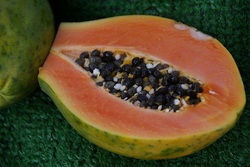
Rainbow papaya is a GMO.
We need to continuously genetically modify domesticated organisms. We, as humans, need to do this because domesticated organisms, both plants and animals, need protection. According to Webster’s New World Dictionary, the word “domesticate” means “to tame (wild animals) and breed for human use” and “to adapt and cultivate (wild plants) for human use”. Notice the words “tame”, “breed”, “adapt”, and “cultivate”. All of these words mean that humans changed the organism, and this is exactly right. Domestication starts with a wild organism. This wild organism has its own defense mechanisms to protect itself and can survive in the wild without human intervention. For example, as stated in the article “Hawaiian Kalo, Past and Future”, “kalo is considered poisonous because its tissues contain an acrid component.” This acrid component is an example of a protective measure that wild kalo have. For animals, from personal experience, I have seen the behavior of wild dogs. Wild dogs tend to be more aggressive, vicious, and very wary of a human’s actions; this hostile behavior is a defense mechanism that allows the dog to survive. However, over time, humans are able to change the genetics of the organism by placing the organism in a different environment or methods such as cross-breeding (which was commonly used by the native Hawaiians to create favorable kalo varieties). However, when changing the organism’s genetics, humans typically get rid of all of the defense mechanisms that the plant or animal has created for itself. For example, roadkill shows that domesticated cats do not have the same heightened awareness of their surroundings as their wild ancestors did. In the case of plants, pulling from my neighbor’s mana’o, unattended plants will die because bugs will eat them or weeds will overpower them; the domesticated plants cannot survive on their own! In addition to bugs, cars, and other predators, domesticated organisms are less able to protect themselves due to the increased likelihood to develop diseases. Domesticated organisms are genetically uniform (class lectures). Pulling from my prior knowledge, genetically uniform organisms are more likely to develop diseases than wild, genetically diverse organisms. For example, kalo tends to be a pretty genetically uniform plant due to a tendency to reproduce it asexually. According to the Bishop Museum website, a cutting of the huli (a cutting of the parent plant) was planted into the ground. This means that they were growing a clone of the parent plant, thus perpetuating the genetically uniformity. Now let’s go back to the definition of domestication. The second part of the definition says, “for human use”. Humans domesticate organisms not to benefit the organism but to benefit us as humans. GMOs provide humans with money. Seedless grapes are an example of this. By grafting methods or the usage of a chemical called giberellic acid, grape farmers change the genetics of normal grapes and are able to grow grapes without seeds (soilassociation.com). If you think about it, growing grapes without seeds is completely impractical because the seed is how a plant is able to reproduce. However, you have to remember that domestication is for human benefit, not the plant’s benefit. Therefore, it is not impractical in the eyes of domestication to grow seedless grapes because humans like them better than grapes that do have seeds. Humans also continue to modify domesticated organisms to make the organism evolve. Like I mentioned earlier, domesticated organisms are genetically uniform. This means that they don’t have many genes to pull from the gene pool. Humans help the plants to become more genetically diverse again by breeding them with other varieties of the organism. One example of this is the cross-breeding of kalo. According to my kalo breeder neighbor, cross-breeding kalo allows new varieties of kalo to be produced. This is beneficial because kalo is typically reproduced asexually (cutting the huli and creating a clone of the parent plant). Cross-breeding allows diversity to come back to some degree and helps the kalo to be more diverse. One example of this is cross-breeding for dogs. According to my friend who is a dog cross-breeder, cross-breeding dogs can be good because purebred dogs are more immune to diseases since they are so closely-interbred. Cross-breeding allows a more evolved type of dog and kalo emerge. Sadly, without this humanistic intervention, not much evolution would take place in these domesticated organisms. In conclusion, humans constantly genetically modify domesticated organisms to promote evolution (even though it’s artificial) and to benefit the humankind financially, not the plant.
 RSS Feed
RSS Feed